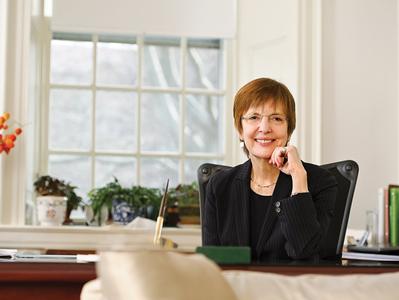A View From College Hill
Collaboration and Experimentation
by President Joan HINDE Stewart
 In May several of my Hamilton colleagues and I took a train to New York City for a symposium, Innovation + Disruption in Higher Education. Organized by Colgate University, the event attracted more than 300 people — higher education administrators and trustees, teachers, journalists, entrepreneurs, career center professionals and others.
In May several of my Hamilton colleagues and I took a train to New York City for a symposium, Innovation + Disruption in Higher Education. Organized by Colgate University, the event attracted more than 300 people — higher education administrators and trustees, teachers, journalists, entrepreneurs, career center professionals and others.
I was part of a panel of six liberal arts college presidents. In envisaging the future of institutions such as ours in a digital age, we brought to bear our own experience at a time when pundits, for-profit providers and columnists have variously prescribed how higher education should respond to change.
There was no disagreement among the presidents that the distinctiveness of a residential liberal arts institution has fundamentally to do with bringing young people into proximity so that they can learn from great teachers and from each other in a 24-7 living and learning community; nor was there disagreement about the importance of the relationships that are formed in such an environment (an aspect of a liberal arts education emphasized by Hamilton Professor of Sociology Dan Chambliss and Christopher Takacs ’05 in their recent book, How College Works).
There was less unanimity about how worried we should be about the challenges ahead. My own feeling is that — given the high cost of the kind of education we offer and the complexity of today’s information environment — collaboration has become more essential than ever.
It is in the spirit of collaboration as well as experimentation that earlier this spring Hamilton and Colgate became contributing members of edX, the nonprofit online learning platform founded by Harvard and MIT. With charter edX members Davidson and Wellesley, Hamilton and Colgate bring to four the number of liberal arts college edX members. Other distinguished organizations whose memberships were announced at the same time as ours include Osaka University, Universidad Autónoma de Madrid, the International Monetary Fund and the Smithsonian Institution.
Hamilton and Colgate joined the consortium in a unique (for edX) partnership: As neighbors and peers, we will share expenses, expertise and technical support related to the creation and production of course content. Most importantly, perhaps, we will reflect together on lessons learned and their applicability to the liberal arts mission.
The two online courses that Hamilton will mount in the first year of our arrangement with edX will be targeted to alumni, parents and the general public and will not be part of our undergraduate curriculum.
This pilot program, which is largely grant-funded, is ambitious but not an entirely new departure. Hamilton has used technology to enhance learning in ways too numerous to list. A couple of examples: With our Mellon Foundation-funded Digital Humanities initiative (DHi), Hamilton became a leader in shaping new research and teaching paradigms in which faculty members collaborate with students. In the last couple of years Professor of Music Lydia Hamessley and Professor Emeritus of English John O’Neill have connected with small groups of geographically dispersed alumni to discuss, respectively, music in film and the novels of Jane Austen. EdX provides an opportunity to see what we can do “at scale” — connecting with hundreds or even thousands of alumni and new friends.
It was as a result of the vision and collaborative efforts of my colleagues Pat Reynolds, vice president for academic affairs, and Dave Smallen, vice president for libraries and information technology, that Hamilton joined edX. Dave and Pat have commented thoughtfully on our objectives and noted that what we learn through this project may help shape our undergraduate pedagogy. You can find their comments on the Hamilton website and Huffington Post. This sort of experimentation positions us — to borrow a phrase used by the Innovation + Disruption organizers — to “seize the initiative in the digital age”: Through collaboration, experimentation and reflection, we in the liberal arts shape our future.
When, in the coming months, our first online offerings are announced to parents, alumni and friends, I hope that you will take the opportunity to study with some of the best and most beloved teachers in the nation as you reconnect with fellow lifelong learners and with your College.
